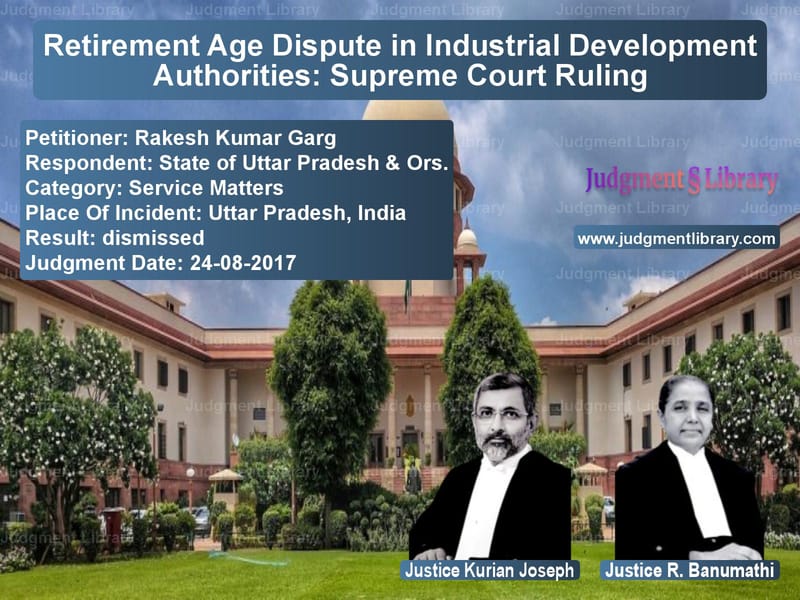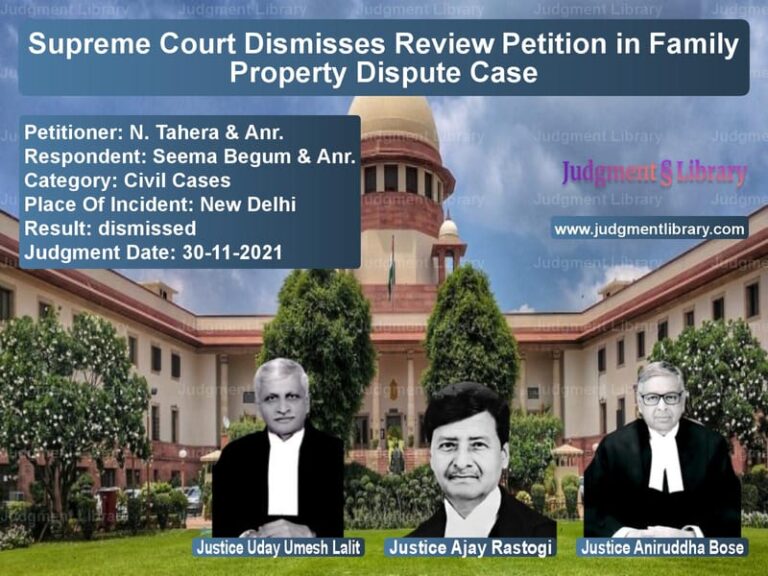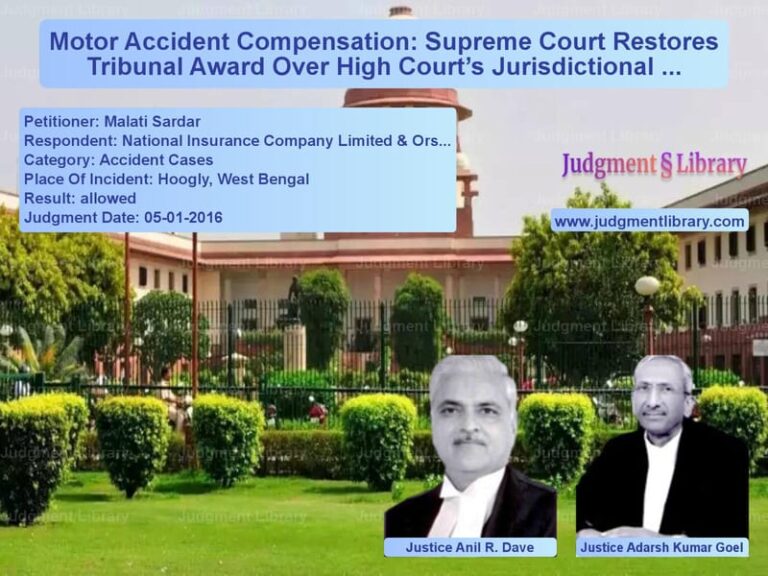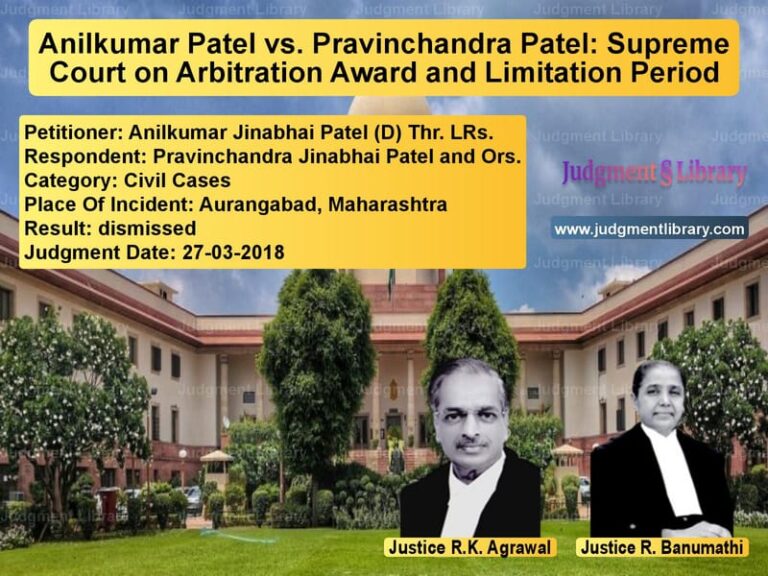Retirement Age Dispute in Industrial Development Authorities: Supreme Court Ruling
The case of Rakesh Kumar Garg vs. State of Uttar Pradesh & Ors. is a significant Supreme Court judgment concerning the disparity in retirement ages across different Industrial Development Authorities in Uttar Pradesh. The petitioner challenged the denial of service extension beyond the age of 58 years, arguing that the retirement age for officers in New Okhla Industrial Development Authority (NOIDA) had been increased to 60 years and should be uniformly applied to other development authorities, including Gorakhpur Industrial Development Authority.
The Supreme Court dismissed the appeal but granted the petitioner the liberty to challenge the government’s decision separately. The judgment underscores the importance of government discretion in administrative matters while maintaining that affected employees have the right to challenge policy decisions.
Background of the Case
The petitioner, Rakesh Kumar Garg, was an officer in the Gorakhpur Industrial Development Authority. He approached the Court seeking continuation of his service up to the age of 60 years, contending that a precedent had already been set in NOIDA, where officers were allowed to serve until 60 following an amendment in service regulations.
However, the State Government had explicitly declined a similar amendment for Gorakhpur Industrial Development Authority, resulting in the petitioner’s retirement at 58. Aggrieved by this, he filed a petition before the Supreme Court.
Key Legal Issues
- Whether the retirement age of officers in different Industrial Development Authorities should be uniform.
- Whether the petitioner had a vested right to claim an extension of service based on NOIDA’s regulation.
- Whether the government’s decision to reject an amendment for Gorakhpur Industrial Development Authority was legally tenable.
- Whether the petitioner could challenge the government’s decision on other legal grounds.
Arguments by the Petitioner (Rakesh Kumar Garg)
The petitioner, through his counsel, argued that:
- The retirement age of officers in NOIDA had been increased to 60 years, and the same rule should apply to all Industrial Development Authorities in Uttar Pradesh.
- Government employees should not be subject to arbitrary distinctions based on their place of service.
- The refusal to extend the retirement age in Gorakhpur Industrial Development Authority violated the principles of equality under Article 14 of the Indian Constitution.
- The decision should be reconsidered in light of fairness and uniformity in employment policies across the state.
Arguments by the Respondent (State of Uttar Pradesh)
The State of Uttar Pradesh, represented by the Additional Advocate General, countered with the following arguments:
- The service conditions and policies for different Industrial Development Authorities are governed by specific regulations, and NOIDA’s policy does not automatically apply to other authorities.
- The government had the discretion to determine retirement age based on administrative and financial considerations.
- The decision to reject an increase in the retirement age for Gorakhpur Industrial Development Authority was taken after due deliberation and could not be challenged merely based on a policy followed elsewhere.
- The petitioner had no vested right to seek a service extension merely because a different authority had a higher retirement age.
Supreme Court’s Judgment
The Supreme Court, in a judgment delivered by Justice Kurian Joseph and Justice R. Banumathi, dismissed the appeal but allowed the petitioner to challenge the government’s decision separately.
1. No Automatic Right to Uniform Retirement Age
The Court held that the retirement age of officers in different Industrial Development Authorities was based on government discretion and did not have to be uniform:
“As far as Gorakhpur Industrial Development Authority is concerned, the State Government has declined permission for considering the proposal for continuance in service up to 60 years of age and amendment of its Regulation accordingly.”
2. Right to Challenge the Government’s Decision
While dismissing the appeal, the Court granted liberty to the petitioner to challenge the government’s order on separate legal grounds:
“The appeal is disposed of, without prejudice to the liberty available to the appellant to challenge the order passed by the Government.”
3. Future Legal Challenges Must Be Decided on Merit
The Court clarified that if the petitioner challenged the government’s decision, it must be adjudicated independently:
“Needless to say that in case the order is so challenged, it will be considered on its own merits.”
Key Takeaways from the Judgment
- Government discretion in service matters: The ruling confirms that the government has the right to establish different retirement policies for different organizations.
- No blanket application of service conditions: The decision clarifies that policies applicable to NOIDA do not automatically extend to other development authorities.
- Employees can challenge policy decisions: The petitioner was given the option to challenge the government’s decision through a separate legal process.
- Judicial restraint in administrative decisions: The Court refrained from interfering in a matter that was within the executive’s domain but ensured procedural fairness.
Impact of the Judgment
This ruling has significant implications for government employees in Uttar Pradesh. It establishes that:
- Retirement age policies can vary across different government organizations.
- Employees cannot automatically claim benefits granted to employees in other organizations.
- Legal remedies remain available to challenge government decisions if they appear unfair or arbitrary.
Conclusion
The Supreme Court’s ruling in Rakesh Kumar Garg vs. State of Uttar Pradesh & Ors. reinforces the principle that service conditions are subject to government discretion and may differ across organizations. The decision upholds the state’s authority in administrative matters while allowing affected employees to seek legal redress if they believe a policy decision is unfair.
By clarifying the applicability of Rule 13(5) and ensuring fairness in government employment policies, this judgment sets an important precedent for future cases related to service conditions in public sector organizations.
Don’t miss out on the full details! Download the complete judgment in PDF format below and gain valuable insights instantly!
Download Judgment: Rakesh Kumar Garg vs State of Uttar Prade Supreme Court of India Judgment Dated 24-08-2017.pdf
Direct Downlaod Judgment: Direct downlaod this Judgment
See all petitions in Employment Disputes
See all petitions in Public Sector Employees
See all petitions in Recruitment Policies
See all petitions in Judgment by Kurian Joseph
See all petitions in Judgment by R. Banumathi
See all petitions in dismissed
See all petitions in supreme court of India judgments August 2017
See all petitions in 2017 judgments
See all posts in Service Matters Category
See all allowed petitions in Service Matters Category
See all Dismissed petitions in Service Matters Category
See all partially allowed petitions in Service Matters Category







